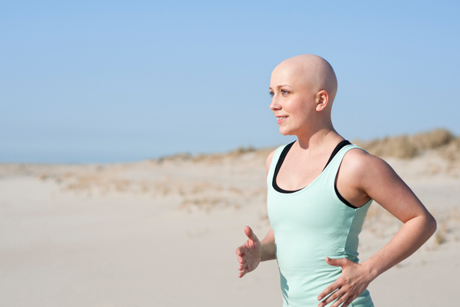For cancer survivors, diet distresses while exercise inspires
By Susan Kelley

While some cancer survivors feel distressed about diet and body weight, exercise helps them feel they are taking back control of their health, Cornell researchers report in the Journal of Nutrition Education and Behavior (May/June issue).
“Cancer survivors’ feeling that they could be active – just getting up in their own home and walking to the kitchen, or having someone help them walk to the mailbox or down the block – was [found to be] very empowering and a stress reliever,” said lead author Mary Maley, M.S. ’07, a extension associate at Cornell’s Bronfenbrenner Center for Translational Research.


But advice from well-meaning family and friends about diet is a source of stress, Maley said. “Often they will say … either ‘You must eat this or you can’t eat that.’ People think they are being helpful but it’s really stressful for someone who is trying to deal with a serious illness. It makes them think, ‘Everyone is telling me what I put in my mouth is either going to save me or kill me.’”
The 36 women in the study, who had had cancer for an average of two years, responded in individual interviews and focus groups most positively to messages that included taking ownership over one’s body, physical activity as stress reduction, nutritious eating for overall health and quality of life.
In 2012 there were 13.7 million cancer survivors in the United States. The largest proportion – 41 percent – had breast cancer. While there is evidence that maintaining a healthy body weight and regular physical activity seem to reduce risk of some cancers and cancer recurrence, about 71 percent of U.S. breast cancer survivors are overweight or obese, and 50-96 percent gain significant weight after diagnosis, Maley said.
To get a better sense of the most effective communication strategies to help people with cancer, the researchers first wanted to understand more about their perceptions of diet, physical activity and body weight. The researchers asked the women such questions as how their eating behavior had changed since diagnosis and how they thought about the relationship between their body weight and their cancer.
The study has practical implications for medical practitioners, cancer support organizations and family members, who could be helpful by offering to support cancer survivors who want to get more exercise, Maley said. Medical professionals could also talk with cancer survivors about their previous physical activity and the level of activity they would like to return to, and educate them about how to eat for health and a healthier body weight.
“Recovery from cancer is not just about the medicine, surgery, chemo and radiation. It’s about the whole picture. [The women said] that if their medical professionals would talk to them about a healthy diet, body weight and exercise, it would help relieve some of the stress, answer some of their questions and help them to feel encouraged and positive about some of the choices they can make.”
Maley’s co-authors are Barbour Warren, a Cornell research associate, and Carol Devine, Ph.D. '90, professor of nutritional sciences.
The research, reported in the paper “A Second Chance: Meanings of Body Weight, Diet and Physical Activity to Women Who Have Experienced Cancer,” was funded by the U.S. Department of Agriculture’s National Institute for Food and Agriculture.
Media Contact
Get Cornell news delivered right to your inbox.
Subscribe